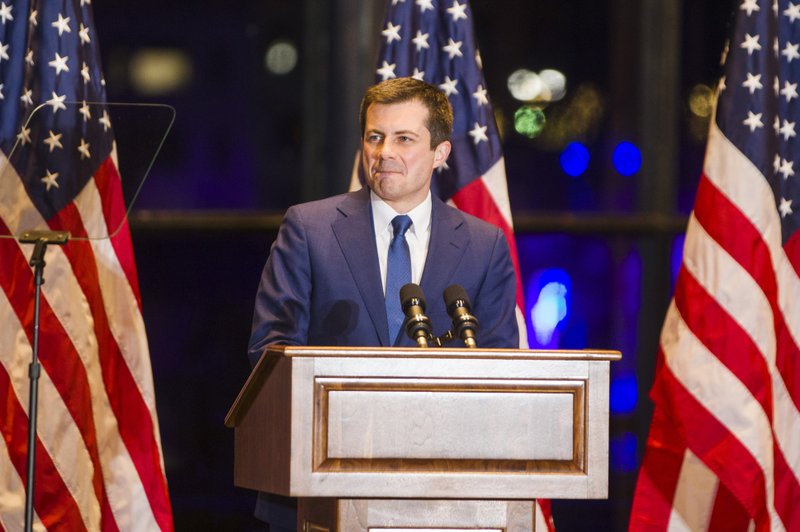
Pete Buttigieg Ends Presidential Campaign, Urges Unity Behind Democrats Left In Field
BY THOMAS BEAUMONT, MEG KINNARD & STEVE PEOPLES / AP
Pete Buttigieg, who rose from being an Indiana mayor to a barrier-breaking, top-tier candidate for the Democratic presidential nomination, ended his campaign on Sunday.
“The truth is the path has narrowed to a close for our candidacy if not for our cause,” Buttigieg told supporters in South Bend, Indiana. “We must recognize that at this point in the race, the best way to keep faith with those goals and ideals is to step aside and help bring our party and country together.”

Democratic presidential candidate and former South Bend, Indiana, Mayor Pete Buttigieg speaks during a speech to supporters on Sunday, March 1, 2020. CREDIT: Santiago Flores/South Bend Tribune via AP
The decision came just a day after one of Buttigieg’s leading rivals, former Vice President Joe Biden, scored a resounding victory in South Carolina that sparked new pressure on the party’s moderate wing to coalesce behind Biden.
Buttigieg had been critical of Biden, charging that the 77-year-old lifelong politician was out of step with today’s politics. But his criticism had shifted in recent days more toward front-runner Bernie Sanders, a polarizing progressive who was benefiting from the sheer number of candidates dividing up the moderate vote.
Buttigieg and former Vice President Joe Biden traded voicemails on Sunday but did not speak, according to a source with knowledge of the attempted conversations. Buttigieg made the first call to tell Biden of his decision, then Biden returned the call. The pair missed each other because of travel logistics.
Buttigieg, the first openly gay candidate to seriously contend for the presidency, tried to make the case that his party thrived when it embraced candidates who offered generational change. But the 38-year-old Afghanistan war veteran ended up being more successful at winning older voters while Sanders, 78, captured the energy of younger ones.
“The Pete Buttigieg story isn’t over. It’s just beginning,” said Democratic strategist David Axelrod. “He’s 38 years old. He’s vaulted himself into the national conversation. He obviously has work to do on some things that — some weaknesses we’ve seen in this election — but whenever there is a conversation again about Democratic candidates, he’ll be in that conversation. And that’s a remarkable achievement, given where he started a year ago.”
Voters saw Buttigieg in the more moderate lane of the Democratic field, and he flourished early with a top finish in the Iowa caucuses and a close second place finish in New Hampshire. But as the race moved to more diverse states, less dependent on college-educated voters, Buttigieg struggled.
Despite robust organizations in Iowa and New Hampshire and supporters who included an influx of former independents and Republicans, Buttigieg failed to overcome daunting questions about his ability to draw African American support key to the Democratic base.
He earned just 3% of the nonwhite vote in South Carolina’s Saturday primary, according to AP VoteCast, a a wide-ranging survey of the electorate.
As mayor of a city that is 25% black, Buttigieg faced criticism for firing the first African American police chief in the history of South Bend and for his handling of the case of a white police officer who fatally shot an armed black man in June.
A Black Lives Matter group from South Bend released a statement saying it was “excited” that Buttigieg left the race. “We hope that he learned his lesson — that neoliberalism and anti-Black policies will no longer be tolerated,” the group wrote.
After his unexpected rise to contention in Iowa and New Hampshire last fall, Buttigieg became the target of Massachusetts Sen. Elizabeth Warren for the high-dollar fundraisers he was hosting, notably one in a wine cave in California.
Minnesota Sen. Amy Klobuchar also went at Buttigieg in the months before the caucuses for lacking national experience. She noted that he had lost his only statewide race as a candidate for Indiana treasurer in 2010, while she had won three statewide terms in Minnesota in part by carrying Republican-heavy regions.
Buttigieg presented a starkly different figure on the debate stage than the other leading candidates — all septuagenarians — and drew admirers for his calm, reasoned demeanor and rhetorical skills that reflected his Harvard-trained, Rhodes scholar background but that some voters and operatives described as “robotic.”
Buttigieg had modeled his campaign somewhat on that of former President Barack Obama, who won the 2008 Iowa caucuses largely based on a message of unity and by drawing in a healthy bloc of first-time caucus participants, often the key in a crowded, high-turnout contest.
Jim Ward, a volunteer on the campaign in South Bend, said he and others were at the local campaign office training at around 6 p.m. when they learned of Buttigieg’s decision.
“They got word and left rather quickly,” he said in a text with the AP, noting that he had mixed emotions.
“I am so proud the campaign and proud of Pete for making this decision when he’s making it and not prolonging the campaign any longer than necessary,” Ward said. “I am just so, so sad that it didn’t work out this time.”
Kinnard reported from Columbia, South Carolina, and Beaumont from Des Moines, Iowa. Associated Press writers Kathleen Ronayne in San Jose, California, Bill Barrow in Atlanta and Michelle Smith in Providence, Rhode Island contributed to this report.
Copyright 2020 Associated Press















